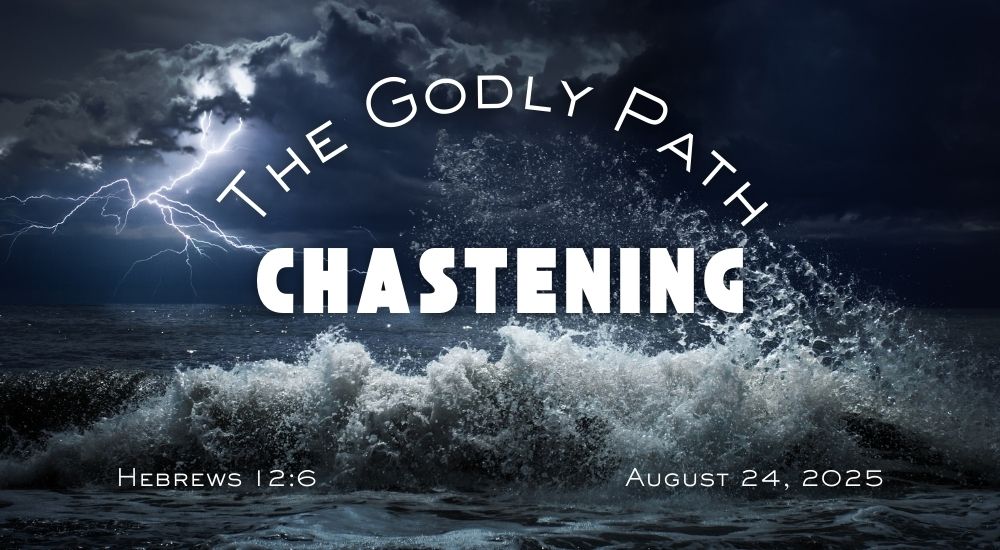
Every Christian must sooner or later experience the Lord’s chastening, and the classic New Testament passage which deals with this subject is Hebrews 12:5-13. This, of course, only concerns Christians, members of God’s family, and therefore has no meaning at all to the unbeliever. God is speaking to His own blood-bought children about matters that intimately concerns them and about which they should be instructed.
Hebrews 12:6: “For the Lord disciplines the one he loves and chastises every son whom he receives.”
- Grammatical Usage: “disciplines” or in the Greek, “paideuei” meaning, “corrects; instructs”; “chastises” or “mastigoi” meaning, “scourge; punish” in the literal or physical sense.
- Literal Interpretation: Because the Lord corrects and instructs everyone he loves, and punishes everyone he accepts as a child.
- Contextual/Comparison: God keeps His Word: God continually uses His Word. What is the Lord’s chastening? It is God’s loving discipline in the life of every one of His children.
Discipline includes instruction, correction and that form of punishment which will prevent or correct us from doing wrong things and will train us to do right things; it is not always in the form of punishment, nor does it follow that because God is chastening us we must necessarily have displeased Him. In a good school all the pupils are disciplined, and in God’s school all His pupils are lovingly disciplined. In our Hebrews 12 text, note:
- Chastening is experienced by ALL the true children of God.
ALL – and therefore if we belong to the Lord this is something we must expect. Look at v. 8: “If you are left without discipline, in which all have participated…”; that is, all Christians. We must expect chastening for two reasons: (1) because God is our Father and chastening is evidence of His love (v. 7); (2) because we are His sons, and chastening is a mark of sonship (v. 8). If we never experience Love’s discipline, then He is not our Father and we are not His children at all!
- We are not to DESPISE His chastening.
That is, we are not to regard it lightly and be insensible to the purpose of it (v. 5). We often do despise the chastening of the Lord; we find ourselves entertaining wrong thoughts about Him and we begin to question His love and His wisdom. Let us beware of treating the chastening of the Lord lightly, or of failing to learn the lesson He is trying to teach us by accepting the chastening.
- We are not to FAINT under it.
V 5 tells us this, and it means, “Don’t collapse!” – as in v. 12!
In the closing months of his life, Hudson Taylor, the great missionary to China, was so weak in body that he said, “I’m so weak, I can’t work, pray or read my Bible. I can only lie still in God’s arms like a little child and trust Him.” But that is all He asks us to do at the best of times, and incidentally, the remedy for becoming weak is mentioned in v. 3.
- God’s chastening is always PROFITABLE.
Sometimes an earthly father will chasten his son arbitrarily in a fit of passion, but our Heavenly Father never does this. His chastening is always for our profit (v. 10). We are apt to think that chastening – sickness, sorrow, bereavement, hardship – spells loss, but it always spells gain. What is the gain that comes out of the Lord’s chastening? V. 10 tells us – “that we may share his holiness.” That is the great purpose in all His chastening – to make us holy, like the Lord Jesus (Romans 8:29). - We are not expected to ENJOY chastening.
It is always “painful” (v. 11). It is not intended to be otherwise. Notice the four words used in this portion of scripture to convey to us the different aspects of God’s chastening:
-
- Exhortation or rebuke (v. 5)
- Chastises or punishment ( v. 6)
- Discipline ( v. 8)
- Correction (v. 9)
Do you like it when the Lord rebukes, punishes, disciplines or corrects you? No – He does not expect you to! But:
- There is ALWAYS a “later on” to chastening.
See v. 11 again. Chastening is fruit-producing. What kind of branch does the Lord purge, and why does He purge it? (John 15:2). The fruit that chastening produces is righteousness and peace (Hebrews 12:11). Righteousness means being right with God, right in our daily living, and therefore in the deepest sense being at peace. In other words, it brings us into conformity to God’s will, and only when we are brought there can we know real peace. When we are being chastened it is very comforting to hear the Lord say, “What I am doing you do not understand now, but afterward you will understand” (John 13:7). Never consider the “now” apart from the “later on”! - We must be TRAINED by all His dealings with us.
This is the condition of blessing, of profit – of present and future reward. Look at the last six words of v. 11: “…who have been trained by it.” And this is for our good: “Besides this, we have had earthly fathers who disciplined us and we respected them. Shall we not much more be subject to the Father of spirits and live?” (v. 9).
- Conclusion: When I am chastened by the Lord, will I recognize and accept it as God’s intention for my good and the working of His will?
